| Listing 1 - 10 of 215 | << page >> |
Sort by
|
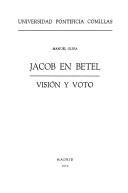
ISBN: 9788440090379 8440090374 Year: 1975 Publisher: Valencia: Institución San Jerónimo,
Abstract | Keywords | Export | Availability | Bookmark
 Loading...
Loading...Choose an application
- Reference Manager
- EndNote
- RefWorks (Direct export to RefWorks)
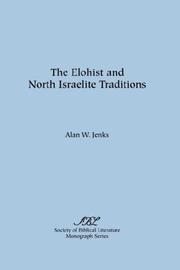
ISBN: 9780891300885 0891300880 Year: 1977 Publisher: Missoula: Scholars Press,
Abstract | Keywords | Export | Availability | Bookmark
 Loading...
Loading...Choose an application
- Reference Manager
- EndNote
- RefWorks (Direct export to RefWorks)
Book
ISBN: 0800625277 9780800625276 Year: 1991 Publisher: Minneapolis: Fortress Press,
Abstract | Keywords | Export | Availability | Bookmark
 Loading...
Loading...Choose an application
- Reference Manager
- EndNote
- RefWorks (Direct export to RefWorks)
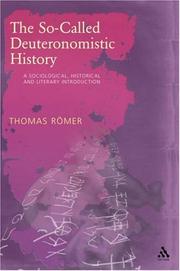
ISBN: 0567040224 0567032124 9780567032126 9780567040220 Year: 2005 Publisher: London: T&T Clark International,
Abstract | Keywords | Export | Availability | Bookmark
 Loading...
Loading...Choose an application
- Reference Manager
- EndNote
- RefWorks (Direct export to RefWorks)
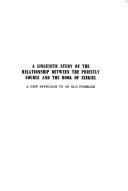
ISBN: 2850210056 9782850210051 Year: 1982 Volume: 20 Publisher: Paris: Gabalda,
Abstract | Keywords | Export | Availability | Bookmark
 Loading...
Loading...Choose an application
- Reference Manager
- EndNote
- RefWorks (Direct export to RefWorks)
P document (Biblical criticism) --- Bible --- Criticism, Textual
Book
ISBN: 9780567512277 0567512274 Year: 1990 Publisher: Sheffield: JSOT,
Abstract | Keywords | Export | Availability | Bookmark
 Loading...
Loading...Choose an application
- Reference Manager
- EndNote
- RefWorks (Direct export to RefWorks)
Book
ISBN: 1606080393 9781606080399 Year: 2008 Publisher: Eugene: Wipf & Stock,
Abstract | Keywords | Export | Availability | Bookmark
 Loading...
Loading...Choose an application
- Reference Manager
- EndNote
- RefWorks (Direct export to RefWorks)
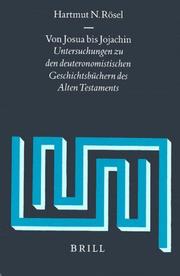
ISSN: 00835889 ISBN: 9004113525 9004276009 9789004113527 9789004276000 Year: 1999 Volume: v. 75 Publisher: Leiden ;Boston Brill
Abstract | Keywords | Export | Availability | Bookmark
 Loading...
Loading...Choose an application
- Reference Manager
- EndNote
- RefWorks (Direct export to RefWorks)
This volume deals with the question of the 'deuteronomistic history' in the Old Testament and attempts to demonstrate that such a uniform history never existed; the books of Deuteronomy - 2 Kings do not contain such a history. The first part of the book shows that there is no homogenous conceptual framework in the deuteronomistic historical books. For example, different concepts of sin and punishment are found. Even the destruction of Judah and Jerusalem does not represent a 'Leitmotiv' of divine punishment. The second part of the book deals with problems relating to the various deuteronomistic redactions in the historical books of the Old Testament. In this book the author introduces new perspectives in the discussion of a central problem of Old Testament scholarship.
Deuteronomistic history (Biblical criticism) --- 222.4 --- Deuteronomic history (Biblical criticism) --- Deuteronomists (Biblical criticism) --- DH (Biblical criticism) --- D document (Biblical criticism) --- Deuteronomium --- Bible. --- Former Prophets --- Neviʼim rishonim --- Profetas primeros --- Prophetae Priores --- Criticism, Redaction.
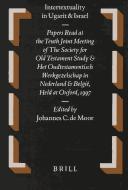
ISBN: 9004118713 9004494235 9789004118713 9789004494237 Year: 2000 Volume: 44 Publisher: Leiden, The Netherlands : Koninklijke Brill,
Abstract | Keywords | Export | Availability | Bookmark
 Loading...
Loading...Choose an application
- Reference Manager
- EndNote
- RefWorks (Direct export to RefWorks)
In the politico-religious history of the Deuteronomists, past, present and future mingle in an often inextricable way. Long obsolete traditions, which had been unacceptable to the Davidic dynasty, were rediscovered and adapted to the aims of the Deuteronomists. Personages of the past were condemned and blackened in the light of the new ideology, whereas others were glorified and embellished as heroes of faith because their ideas suited the historians. This inevitably raises the question whether the Bible can be trusted as a source book for writing a history of Israel. Apparently not, say scholars like T.L. Thompson, P.R. Davies and N.P. Lemche. In this volume a number of authors take up this challenge, stating that the radical rejection of the biblical testimony in favour of a history based mainly on archaeology is ill-advised. Several contributions to this volume draw instructive parallels between the process of re-writing the history of South Africa and the work of the Deuteronomists.
Deuteronomistic history (Biblical criticism) --- 222.4 --- 224 --- Deuteronomic history (Biblical criticism) --- Deuteronomists (Biblical criticism) --- DH (Biblical criticism) --- D document (Biblical criticism) --- Deuteronomium --- Profetische boeken van het Oude Testament --- Congresses --- Deuteronomistic history (Biblical criticism) - Congresses. --- Deuteronomist history (Biblical criticism) --- Prophet --- Prophets --- Biblical teaching --- Bible AT Deutéronome --- Prophètes --- Document D (critique biblique) --- Critique, interprétation, etc --- Enseignement biblique --- Prophet.
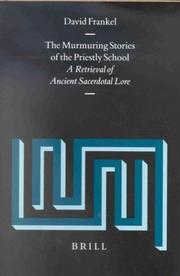
ISBN: 9004123687 9004276157 9789004123687 9789004276154 Year: 2002 Volume: 89 Publisher: Leiden, NetherlandsBoston, Mass. Brill
Abstract | Keywords | Export | Availability | Bookmark
 Loading...
Loading...Choose an application
- Reference Manager
- EndNote
- RefWorks (Direct export to RefWorks)
This book deals with the stories of Israelite complaint or murmuring in the wilderness found in the books of Exodus and Numbers that were composed and edited by the priesthood of ancient Israel. It discusses the significance of the theme of rebellion and complaint for the ancient priests and analyses the part they played in the development of the theme in the Pentateuch. After a general introduction on the theme of murmuring and on the Priestly School, the book goes on to analyze four major priestly texts: the manna story (Exodus 16); the story of the Scouts (Numbers 13-14); the story of the rebellions surrounding the figure of Korah (Numbers 16-17) and the story of the Waters of Merivah (Numbers 20). The significance of the book is two-fold. First, it develops a methodology that allows one to discriminate between early priestly narrative materials and later priestly editorial supplementation. Second, the work demonstrates the antiquity of the priestly narrative lore in the Pentateuch and the significant role which the priests played in creating and developing major narrative traditions in ancient Israel.
P document (Biblical criticism) --- 222.3 --- Priestly document (Biblical criticism) --- Exodus. Leviticus. Numeri --- Bible. --- Criticism, interpretation, etc.
| Listing 1 - 10 of 215 | << page >> |
Sort by
|

 Search
Search Feedback
Feedback About UniCat
About UniCat  Help
Help News
News